CAPE CANAVERAL SPACE FORCE STATION — It looked like Mother Nature decided to play nice and allowed SpaceX to launch more than 20 Starlink satellites early Friday morning.
What You Need To Know
- SpaceX's Falcon 9 rocket launched 22 second-generation Starlink satellites
- 🔻Scroll down to watch the launch🔻
Liftoff! pic.twitter.com/c8hzT8pqnf
— SpaceX (@SpaceX) May 19, 2023
From Space Launch Complex 40 at Cape Canaveral Space Force Station, Falcon 9 rocket sent up 22 second-generation Starlink satellites to low-Earth orbit.
The launch took place at about 2:19 a.m. ET. It was originally scheduled for 12:41 ET, with backup times at 1:31 a.m. ET, 2:19 a.m. ET and 3:09 a.m. ET.
If the mission was pushed back, the next chance would have been on Saturday, May 20.
For Friday morning’s launch, the 45th Weather Squadron gave a 60% chance of good weather conditions, however, there was a concern with the forecast.
“We're in an active pattern right now with daily storms, and while much of the activity will die down after sunset, we'll be watching to see how any lingering effects carry into the overnight hours with any residual clouds along the Space Coast,” said Spectrum News meteorologist Maureen McCann the day before the launch.
In fact, the 45th Weather Squadron’s primary concerns for the launch were the following rules: Anvil cloud, debris cloud and cumulus cloud.
Learn more about NASA’s weather criteria for the Falcon 9 rocket here.
B1076, the first-stage booster for the Starlink 6-3 mission, has successfully launched the following:
- CRS-26
- OneWeb Flight 16
- one Starlink
- Intelsat IS-40e
After the rocket's stage separation, the first stage landed on the droneship A Shortfall of Gravitas in the Atlantic Ocean.
Falcon 9’s first stage has landed on the A Shortfall of Gravitas droneship pic.twitter.com/yBjjF8J52x
— SpaceX (@SpaceX) May 19, 2023
About the mission
The Starlink 6-3 mission launched 22 second-generation Starlink satellites, where they will join the thousands already in orbit.
The satellites provide broadband internet service to many parts of the globe. The Starlink company is owned by SpaceX.
Before Friday morning’s launch, astronomer Jonathan McDowell of Harvard-Smithsonian Center for Astrophysics recorded the current information on the Starlink satellites: 4,127 are in orbit, with 4,090 in working order and 3,443 actively operating.



